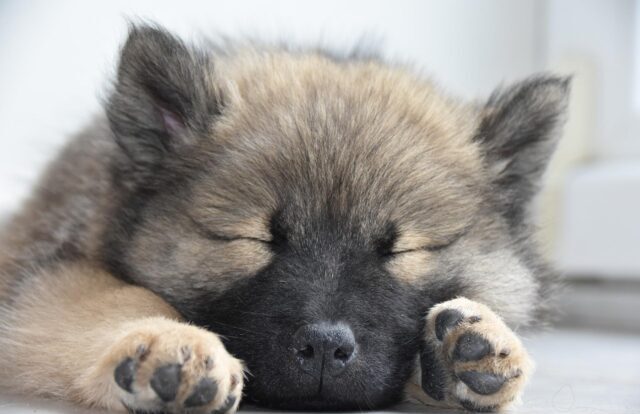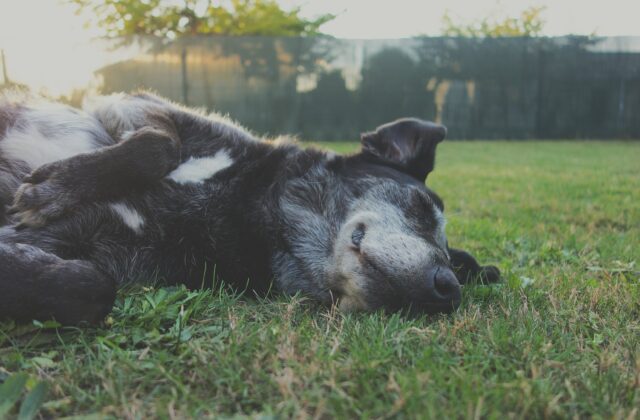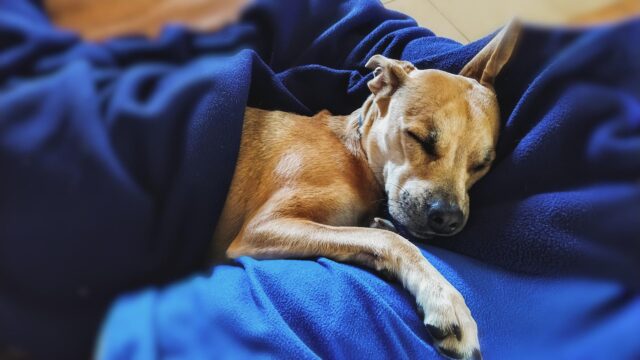Whenever a dog twitches their feet or whimpers in their sleep, we can’t help but wonder what they’re dreaming about. If they look like they’re trying to run, we assume they’re thinking about chasing a squirrel or bunny. Humans have been in awe of sleeping dogs since ancient times, so scientists decided to look into the situation more.
As it turns out, dreaming might not be the only explanation for dogs “running” in their sleep. It’s possible that dogs can dream, but researchers found other reasons for these moving feet. Either way, sleeping dogs will still be adorable, but it’s fascinating to think about what could be going on in their heads.

Why Do Dogs Twitch While They Sleep?
When dogs, humans, and other animals experience sudden movements during sleep, it’s called myoclonus. Myoclonus is common in REM sleep, and it usually consists of leg twitching or eye flickering. In humans, we know that REM sleep leads to a variety of unique dreams. While dogs experience many similar habits during sleep, it’s unclear if their movements are related to dreams.
“From dogs to humans, most mammals exhibit the same basic states of sleep,” said neuroscientist Marcos Frank. “We can’t say conclusively that dogs are having experiences like we do when we dream, but it’s hard not to imagine they are.”
RELATED: Science Confirms It – Yes Your Dog Should Sleep in Your Bed
Small movements may be related to dreams, but more intense “running” may be linked to more than that. When we sleep, our bodies become paralyzed from the neck down so we don’t act out while sleeping. Scientists found that if the structure that causes that paralysis doesn’t function correctly, it could lead to bigger movements at night. The structure is a part of the brainstem called pons.

A study from the 1970s revealed that adding lesions to the brainstems of cats caused them to lift their heads and leap while sleeping. So, if a dog has damaged pons, they’re more likely to move around in their sleep.
What Goes on in a Dog’s Head During Sleep?
We can’t know for sure if dogs dream or what they might dream about because they can’t tell us. But we can make guesses based on science. Scientists believe that a dog’s brain works on consolidating memories during REM sleep as a human’s does. This idea came from a 2001 study that showed sleeping rats would mimic movements they made earlier in the day when running through a maze.
Then, a 2017 study suggested that dogs also reinforce their memories while sleeping. The dogs in the study learned new voice commands before sleeping or playing. The dogs who slept after the training were better at remembering the task than the dogs who played after. So, it’s likely that a dog’s movements when they sleep are related to them remembering events from the day.

RELATED: Your Dog’s Sleeping Habits Can Reveal Secrets About Their Health & Personality
Since dogs don’t have nearly as good eyesight as humans, it’s suspected that their memories rely mostly on smell instead of sight. So, if dogs dream, they may be experiencing a world of smells rather than a visual one.
“I think there’s some sensory context that must conform to what the mental contents are,” Frank said. “I’ve always wondered, when dogs dream, is it a world of smells they’re experiencing?”
Sleeping Dogs Continue to Fascinate Humans
Ever since dogs and humans started living side-by-side, we’ve been curious about their habits. Even Greek philosophers like Aristotle made references to animal dreams. Living close to a domesticated animal is bound to make most people curious, which is why we adore watching our dogs sleep.

“In dreaming, you really see the power of the mind at work,” said philosopher David M. Peña-Guzmán. “It is a really powerful reminder of how much we have underestimated and understudied animals and the extent to which the animal mind remains this unexplored territory about which we know relatively little.”
Not all scientists agree with what happens when dogs sleep. Are their reasons for twitching related to dreams like ours? Unfortunately, there’s no way to know at this time. So, one thing that most researchers can agree on is that there’s still so much to learn about sleeping animals. If only our dogs could tell us the truth!
 Toledo, United States.
Toledo, United States.